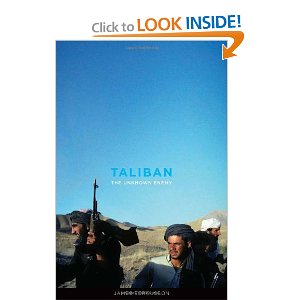
Insights into the Taliban….not available from US intelligence….
TALIBAN: The Unknown Enemy
By James Fergusson
Da Capo, 432 pp., $27.50
By Chuck Leddy – Boston Globe Correspondent / June 1, 2011
Journalist James Fergusson has spent more than a decade covering the Taliban, from its beginnings in the 1990s as a militant Islamist response to the brutal warlordism then dominating Afghanistan to its 2001 ouster by US-led forces to its present-day battle to topple the US-supported Afghan regime of President Hamid Karzai. Rather than present the Taliban as a caricature of jihadist, misogynistic thugs, Fergusson has worked hard to understand them. Filled with insights about the group’s origins and motivations, this sympathetic and eye-opening account should be required reading for anyone seeking to understand contemporary Afghanistan.

Fergusson opens with a portrait of the burned-out, lawless hellscape of Afghanistan in the aftermath of Soviet occupation. With multiple tribal warlords practicing highway robbery and murder, absent any control from a viable, centralized government, Afghanistan was a Hobbesian “failed state’’ run by bandits. The Taliban coalesced around a few mujahideen — holy warriors — who had been part of the insurgency that ousted the Soviet army. These fighters sought to restore order under sharia, Islamic holy law. But the Taliban were also Pashtun tribesmen. It is in explaining the complex interconnections between Pashtun and Islamic traditions that Fergusson truly shows his understanding of the organization.
Fergusson describes how the militarily powerful Taliban took over Afghanistan in the late 1990s but lost the global public relations war. The movement was irreparably tainted by horrific videos of public executions and reports of extreme restrictions against women. “From 1997 on,’’ Fergusson writes, “the Taliban were almost universally portrayed in the West as a regime beyond comprehension or redemption.’’
But what these Western reports never quite explained, Fergusson notes, is how the Taliban brought law (however harsh) and order to a nation that had rarely seen either. Today, Fergusson reports, the Taliban are riding a growing wave of anti-Americanism and anti-corruption sentiment triggered by both US military operations and strong support for Karzai, who is considered unusually corrupt by the standards of a country where governmental corruption is the norm.
As he travels a few miles outside the capital, Kabul, Fergusson observes the resurgent Taliban collecting taxes, meting out local justice, attacking American soldiers, and pockmarking the roads with bombs. Taliban commanders repeatedly tell Fergusson that the Americans must depart before national reconciliation can begin. Even an Afghan police officer, ostensibly an agent of the Karzai government, denounces the American military presence: “If [US soldiers] kill fifty people, they create five hundred Taliban,’’ he tells Fergusson, “If they did something to my family . . . I’d take revenge. I hate the Americans.’’ And he’s supposed to be on our side.
One disillusioned local official tells Fergusson, “Warlordism and insecurity have returned, and the people are fed up. They are ready to welcome the Taliban back again.’’ Indeed, the Taliban are coming back just when the Obama administration has reduced US forces in Afghanistan. Fergusson makes clear the differences between the Taliban and Al Qaeda. Many of those inside the Taliban told Fergusson that they would welcome an agreement with Washington that would swap the exclusion of Al Qaeda from Afghanistan for an American pullout and foreign aid.
Fergusson makes a powerful case that US strategy in the region is failing, and that bringing the Taliban to the negotiating table is the most sensible option. This is a provocative account written by somebody who’s talked to all the relevant parties, however unsavory, and has learned to navigate some of the world’s most treacherous terrain. In the end, Fergusson believes that talking with the Taliban might work better than fighting them.
Chuck Leddy, a freelance writer who lives in Dorchester, can be reached at chuckleddy@comcast.net.



